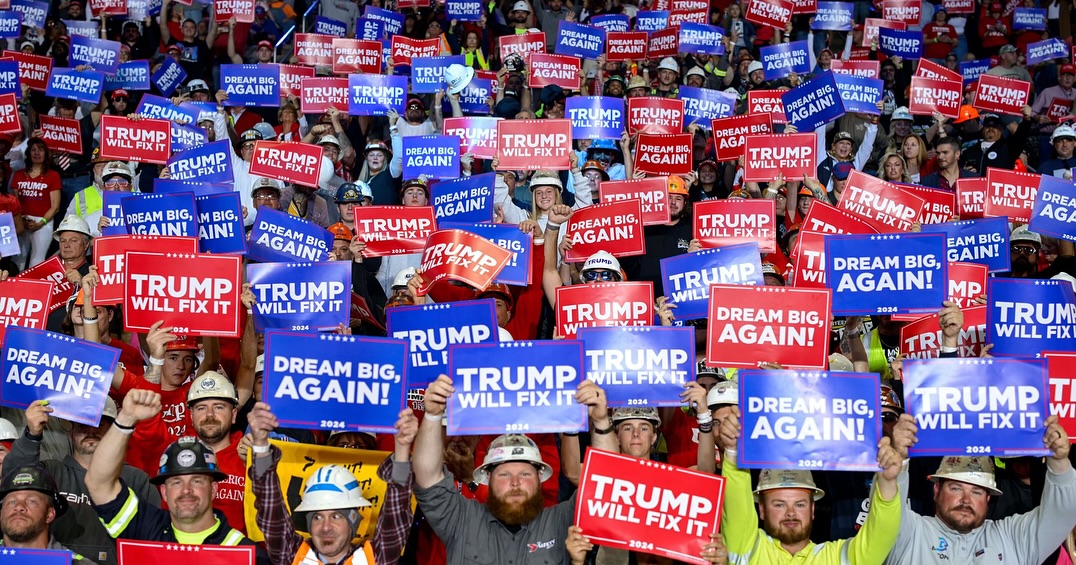News
Trump vs. democracy itself

So Donald Trump and the Republicans don’t have a strong mandate to tear down democracy and American institutions. But they do have the means. (File Photo: Donald J. Trump/Facebook)
(Version française disponible ici)
Democracy rests on a delicate balance. It’s about giving voters choices, in the hope that they won’t opt for political forces that run counter to freedom, social justice and rights. The secret lies in the establishment of institutions, practices and social norms conducive to equality and pluralism.
Over the past twenty years, there has been no shortage of examples of democracies deteriorating and moving towards authoritarianism. We can even speak of a worldwide retreat from democracy. This backsliding more often concerns recent and less secure democracies, such as Hungary, Venezuela or Turkey, but it also affects established democracies.
The new American president-elect, for example, makes no secret of his preference for authoritarian regimes. Like the dictators and autocrats he admires, Donald Trump wants elections he never loses, a lawless presidency, a judiciary and civil service subservient to the executive branch, and a police and military ready to suppress any opposition. And he’s going to use any tools he can find to move in that direction.
What does the vote really mean?
A slim majority of Americans voted in favor of this authoritarian shift, which also brings with it setbacks for the rights of women and minorities, the dismantling of measures to promote the energy transition, and a deterioration in public services.
How is this possible? Do Americans care so little about their democratic institutions?
The silliest explanation, put forward by some on the intellectual right, is to see intention in this result. The American people, they say, have thrown out disconnected elites obsessed with gender theory, minority identities and unlimited openness to immigration, thus vindicating a more reasonable right-wing, a saviour for the nation.
In fact, as British political scientist Ben Ansell notes in a recent book on the pitfalls of democratic life, the will of the people, so dear to these right-wing intellectuals, does not exist. After an election, the total votes cast only express the sum of our disagreements, and even then only imperfectly. The election designates a winner, but it does not formulate a clear, unequivocal mandate.
Almost half of American voters voted against Trump, others voted for him on the assumption that he wouldn’t go as far as he suggested, and still others religiously bought everything that came with the candidate. It’s hard to pin this mix of motives down to a single intention.
A protest vote
The most plausible explanation identifies less a reasoned choice than dissatisfaction, a widespread dismay at the rising cost of living. In a blog post, American political scientist John Sides notes that Donald Trump’s gains in the 2020 presidential election are evident across the country and in almost every social category. This general trend suggests a general cause, affecting all voters. As is often the case, that is the economy (stupid!).
Growth and employment are going well in the U.S., but the rising cost of living is causing concern and would have led many voters to blame the incumbent party, to the benefit of its opponents. Most Democrats remained Democrats and most Republicans voted for Trump, but in the space between the two parties, just enough voters switched sides to give Trump a victory.
There is no easy path ahead for U.S. trading partners
Canada needs to find new geopolitical and economic strategy to avoid getting squeezed
Among them were even Hispanics and Blacks, apparently unaware of or indifferent to the explicit racism of Trump and his entourage. There were also, no doubt, voters caught up in the flood of misinformation that now characterizes the public arena. Democracy is not always a demonstration of informed choice.
So Donald Trump and the Republicans don’t have a strong mandate to tear down democracy and American institutions. But they do have the means. With the presidency and a majority in both houses of Congress, an accommodating Supreme Court and a polarized and often precarious media, America’s famous system of checks and balances have rarely been so weak.
No mandate but definitely methods
Political scientist Donald Moynihan, a specialist in American public administration, predicts that many positions in government will be redefined as political, allowing large numbers of civil servants to be laid off and replaced by genuinely political – or downright ideological – appointments, particularly in “left-wing agencies”, i.e. those concerned with social justice, public health or environmental protection.
Laws and regulations in these sectors will be largely eliminated or rendered inoperative, conflicts of interest will multiply (Elon Musk practically camps out at Mar-a-Lago to give his opinion on almost everything) and corruption will spread. Administrative competence will deteriorate, making it even more plausible that people can’t count on government intervention.
The United States is already an exception among wealthy democracies, with a health-care system that doesn’t cover the entire population, limited social programs, pronounced income inequalities, and a fragmented and often manipulated electoral system. The 2024 elections will reinforce this exceptionalism, and could contribute to undermining democracy itself, in the U.S. and around the world.
This article first appeared on Policy Options and is republished here under a Creative Commons license.





















